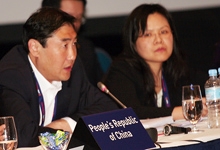Review Notes China's Progress in Achieving Free Trade and Investment Goals
A review of China's progress to achieve its APEC free trade and investment goals has stated that China has greatly contributed to the trade and investment environment in the APEC region.
The Study Report on China's Individual Action Plan (IAP) was reviewed by representatives of APEC's Member Economies in Cairns today.
IAPs are developed by each APEC Member Economy to guide them in their efforts to achieve APEC's Bogor Goals of free trade and investment in the Asia-Pacific region by 2010 for industrialized economies and 2020 for developing economies.
The IAP review program provides each APEC Member with the opportunity to have their progress towards APEC's goals assessed by Independent Experts. A peer review session is then conducted in which officials from other economies pose questions to the economy under review to better understand where progress is being made and where additional efforts may be required.
The report into China's progress stated that China has made important steps towards attaining APEC's free trade and investment goals by "lowering trade barriers and improving accessibility to goods and services imported from the rest of the world."
The report also noted China's implementation of WTO commitments has resulted in a significant improvement of its APEC IAP noting that: "Trade barriers in the trade in goods and services have been continuously lowered over the past five years."
Making mention of the location of China's key export markets, the report cited the influence of the APEC process in China stating that APEC has become "very influential in determining subsequent economic policies in China-and for good reason, as the members of APEC are among China's most important trading partners."
In 2006, the total value of trade between China and APEC Member Economies exceeded 1.1 trillion US dollars, comprising 65 percent of China's total trade volume.
The report did state however that Chinese authorities are still coming to grips with reorienting China's economy to operate on market-based principles: "Observers note concerns in resource allocation mechanisms, particularly in state-owned enterprises and the banking industry." However, the report noted that in general "Chinese authorities have committed the direction of policy to the improvement of the market economy in China."
The report highlighted environmental management as posing significant challenges. "Chinese authorities recognize environmental concerns and have included the policy objective of accelerating environmental protection in its Eleventh Five-Year Plan."
The report also took note of China's attempts to strengthen its services sector through reform efforts. "After three decades of rapid economic growth led by the manufacturing sector, China aims to upgrade its industrial and export structure by focusing more on the service industry, and it appears that China has made good use of liberal reforms as a tool for this end," the report stated.
The report went on to observe that China had exceeded expectations in some areas, particularly in some sectors such as banking and the securities market where "China has liberalized beyond its obligation, indicating that liberalization is its basic policy direction."
The report also looked at China's efforts to strengthen Intellectual Property Rights Protection (IPR) since the last peer review in 2003 observing that: "China has made significant advances in IPR protection anchored on commitments from the highest political levels. There are problems in enforcement but specific measures are being put in place to contain the extent of IPR infringement."
In this area, the report also cited the increased need for IPR protection by businesses in China as one factor contributing to a growing appreciation of IPR. "One favorable development is the growing domestic constituency for IPR protection. As local demand for IP protection increases, so should awareness and adherence to IPR protection."
The report was researched and written by Professor Hongyul Han, from the Economics Division at the Hangyang University College of Economics and Commerce in Korea, and Assistant Professor George Manzano from the School of Economics at the University of Asia and the Pacific in the Philippines.
Three APEC Member Economies, China, Korea and New Zealand, are having their IAPs' reviewed at the current round of APEC meetings taking place in Cairns.
The full report will be made available on the APEC website (www.apec.org) after it has been presented to APEC Senior Officials on July 3.


